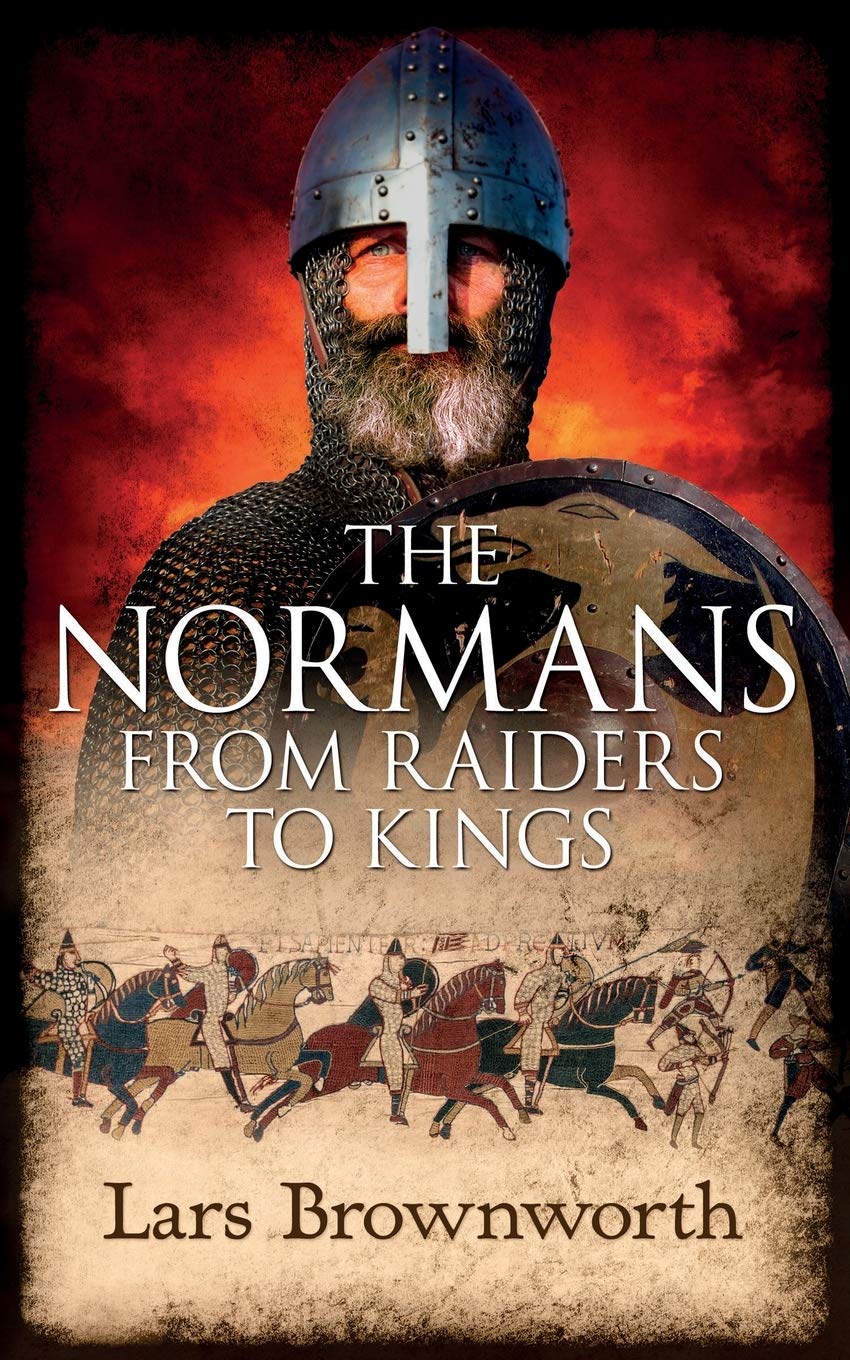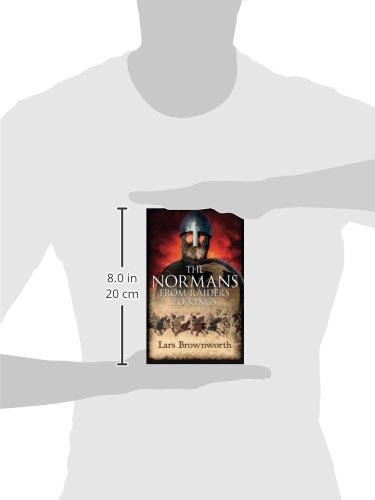



Full description not available
R**Y
Great overview, but incomplete
Lars Brownworth has written a readable overview and interesting history of the Normans and their impact on Europe from approximately the 11th into the 13th centuries. As he notes up front the impact of the Normans goes beyond the better known history of Hastings, William the Conqueror, and England and stretches across southern Europe into the Middle East.The book begins with the origins of the Normans, as Viking raiders who were given Normandy by the French king, and examines how these Vikings built the region into a stable and often competing political entity. Naturally, any book on the Normans has to include their invasion and rule of England, and the turmoil this caused as future Norman/English kings fought to protect their lands on the continent from the French king.From there Brownworth follows mercenary Norman knights to Sicily and southern Italy where they eventually established their own kingdom that was often at odds with the Pope, Byzantium, and the Holy Roman Empire and routinely influenced who actually held the papacy. At the same time, when they weren’t fighting each other, the Pope, or the Holy Roman Emperor, they were pushing their armies and navies through Greece in their attempts to take Constantinople.They did all this while building a multi-cultural and wealthy kingdom, that lasted until the 19th century, and that had a stable bureaucracy rather than a feudal model for government. This allowed the kingdom to financially influence the entire region and maintain large armies over longer periods of time than their feudal opponents. The Normans did not rule a petty state; their economic and military strength led the major powers of the time to seek to intermarry with the Norman rulers of Sicily, and turn to them for military alliances as the balance of power shifted among the powers of central Europe and the Middle East. It is this review of the creation and Norman rule of the Kingdom of Sicily where the book shines.At the same time, and also less well known, was the Normans’ role in the First Crusade. Brownworth briefly covers the success of Bohemond in establishing the Principality of Antioch and whose direct descendent ruled the city until 1268. If there’s a weakness to the book, and a minor one at that, it’s that the author leaves off the portion of the Norman story beyond the capture of Antioch, and never addresses the importance of this Norman Crusader country to the Outremer states of the Holy Land.I would definitely recommend this book to anyone who wants an "overview" about the Normans and their impact on southern Europe in the 11th and 12th centuries. While there is definitely a story beyond the Norman Conquest of England, keep in mind this is an overview and lacks the specificity of other books that are more focused on the Normans in England, Antioch, or even Sicily.
A**H
Proofreading would have helped.
This work is a much-appreciated sequel to The Sea Wolves. It covers a period of history too little known after the cessation of the Viking raids. It is clear and informative and written in a style that presents no problem to comprehension; however, the author is guilty of numerous mistakes in grammar and punctuation, as well as others. For example, on page 37 we read, “There [Robert] unexpectedly fell ill, and on July 2, 1035, he died.” But on page 39 he did not live so long, “… he died early the next spring….”Unlike in The Sea Wolves the author here unfortunately places the footnotes at the end of the book, jumping from Chapter 3 footnotes to Chapter 5 footnotes, placing Chapter 4 footnotes in Chapter 3 and ignoring Chapter 4 altogether at the end of the book. Confusing? You should try following the footnotes in the book itself, which later in Chapter 11 has footnote 5 being followed by footnote 38!On page 102 writing of Bohemond, the author states, “As he was crossing a river in northern Greece, Alexis lured him into attacking a decoy force while the main imperial army plundered the Norman baggage.” Who was crossing a river? Alexis or Bohemond? Form says it was Alexis, but context indicates that it was Bohemond. Why should the reader have to stop and figure out what the author was trying to say? Perhaps the author should revisit English 101 and study the chapter on dangling participles.No author should treat rules of grammar as if they were optional; however, Lars Brownworth cavalierly writes, “… one in five of the native population were [sic] either killed or starved….” “… he found a wondering monk whom [sic] he claimed was the deposed emperor Michael….” Whom cannot be the direct or indirect object of claimed. It is the subject of was and thus has to be who.The author also falls victim to the practice of placing the adverb only before the verb regardless of what action or circumstance it modifies, e.g. “He attempted a ferocious assault against the section of walls that Bohemond was defending and was only beaten back with the greatest of difficulty.” This is one of numerous examples that could be improved by, in this case, placing only before “with the greatest of difficulty.”Another lapse: “… his new wife Adelaide safely delivered two sons. The oldest [sic] was named Simon, and the younger Roger after his happy father….” Why does the author mix the superlative and comparative degrees when writing of only two sons? It is indeed difficult to explain. But why should the reader be faced with such violations of elementary rules of grammar?Consistent with his habit of misusing the verb “to hang” in the past tense (when speaking of an execution of a person) the author writes also in this work, “The first [of the two barons] was hung [sic] while the second was made to hold the rope….”Proofreading (and correction) would have helped clarify what was meant by the following: “The man Guiscard had left to represent him southern Italy wrote desperately….”In spite of the fact that this work suffers in form from having not been carefully proofread the content is only partially damaged and certainly not beyond the repair which the reader must undertake. It is unfair to rate The Normans as only a 3 because of the considerable research apparent in all the facts and descriptions contained therein. It does contain an appendix, though not named as such, and a bibliography, but unfortunately no index. Since there is no 3+ or 4- rating, it must be a 4.
B**O
Brownworth writes history like a novel
Just finished this last night, after having previously read Lost to the West and Sea Wolves, both by the same author.Brownworth writes history like a novel. Very informative and factual, but reads very breezy. I hope he has another book in store, because I have not found a historian whose writing style I like more.This book also has a section with excellent maps, a glossary of people, charts showing the reigns of various kingdoms. These extras add a lot.My only complaint is directed at the publisher. So shoddy! There are mistakes left and right, the most glaring- the footnotes. The footnotes don't match the chapter! Completely misnumbered. And then parts in the glossary that should be bolded aren't, and parts that shouldn't be bolded are...it's a mess, very poor print job, which is unfortunate for such a superbly written and researched book.
T**5
Good narrative, nicely paced
I started reading this book as a follow-up to another book by Lars Brownworth about Vikings. The book is very informative and tells history as a story about powerful people and the how they influenced events in the times they lived in. It goes into enough detail to provide a context for the story the author is telling without getting bogged down in names and dates and dry meaningless details that turns so many people off to history.Power can be inherited because of one's birth, but if the person it is bestowed upon is a fool or an idiot, it does not last long before it goes to someone else. The lessons of history are a valuable insight into human nature and how powerful individuals can create a nexus which bends the course of events around their wills and desires.
B**4
Great read
Perfect Condition
A**R
Wonderful
One more great work of Lars brownworth. I never imagine such a world existence. Thanks Lars for a great lecture.
J**O
Clear easy read!
It is a fantastic read as it doesnt get boggged down in minutia and while I am well read in Norman history it was still refreshing and informative while still remaining a fun read. The time period has allot to offer in entertainment and factual content which the author has captured well.
V**R
surprisingly good
It was a great book and very incisive on the Norman world. I really enjoyed it and strongly recommend it to any lover of history.
D**Y
Easy to read overview of the Normans
This breezy book on the Normans seemed to be quite well-researched and an easy read. However, too much on the Sicily and Italian territories and not enough on the Normans in England after 1066 for my liking, as those are my ancestors.
Trustpilot
3 weeks ago
4 days ago